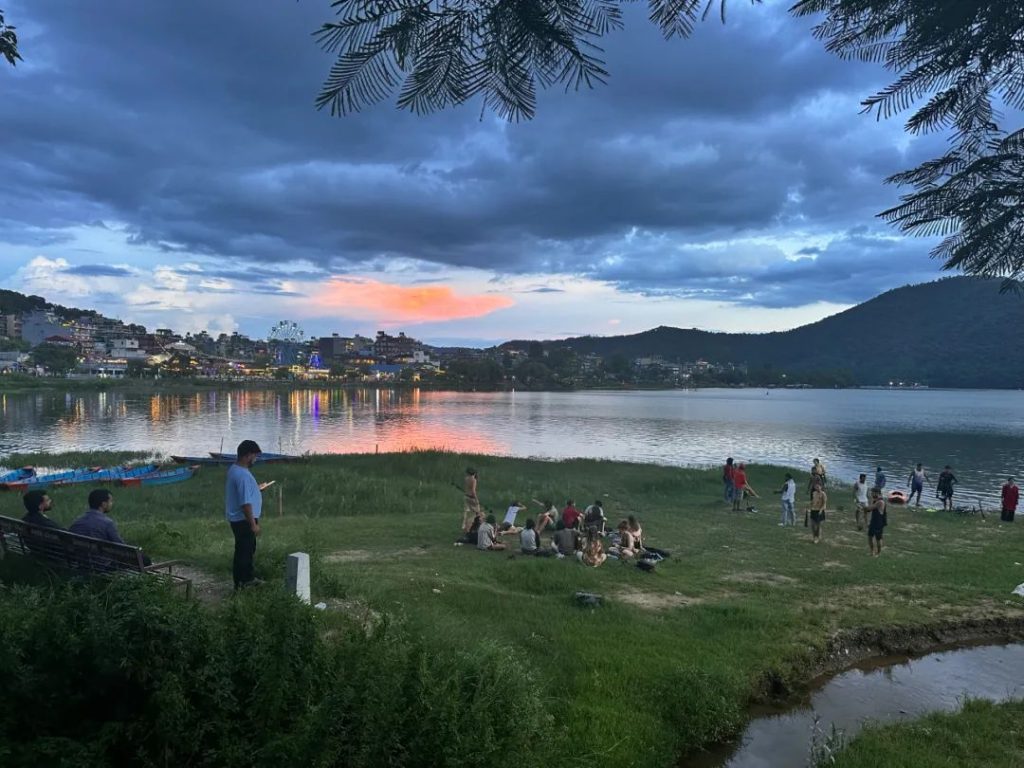
Read More《裸辞的年轻人,把尼泊尔躺成大理「平替」》
Positive Comments: Nepal Becomes a “Spiritual Healing Ground” and a “Low-cost Growth Laboratory” for Young People Who Quit Their Jobs without a Backup
In recent years, the intensifying “rat race” in the domestic workplace has put young people under work pressure, job burnout, and even the risk of lay – offs. Against this backdrop, Nepal, with its unique slow – paced life, low prices, and a social atmosphere where work is not a topic of conversation, has quickly become a “spiritual healing ground” and a “low – cost growth laboratory” for young people who quit their jobs without a backup, and its positive significance is worthy of recognition.
First of all, Nepal’s slow – paced environment provides young people with precious psychological repair space. As mentioned in the news, life in Nepal is “all about slowness”: restaurants cook in a casual way, rickshaw drivers often get lost and chat, and locals “go boating and climbing mountains when there are no customers”. This lifestyle, which is completely contrary to the “fast – paced” life in China, serves as a “noise – reducer” for young people who quit their jobs. At first, Yueyue was “unaccustomed” to it but later “immersed in the charm of the slow – paced life”. Her daily schedule changed from “staying up until 1 am” to “going to bed at 10 pm and getting up at 6 am”; Tiaotiao, who “fainted due to overtime work”, now “sleeps until naturally waking up every day and strolls in the park leisurely”. These cases all confirm the healing effect of a slow life on the body and mind. In China, office workers are often kidnapped by the concept of “efficiency first” and even equate “busyness” with “value”. However, in Nepal, “doing nothing is also something”, which helps young people break out of this alienated perception and rediscover the meaning of life itself.
Secondly, Nepal’s low prices and abundant learning resources enable young people to achieve self – improvement and experience upgrading at a “low cost”. As one of the “least developed countries”, Nepal has a per – capita GDP of only about 10,000 RMB, which makes domestic young people become a “high – income group” here: the monthly rent of a guesthouse is 1,200 – 1,700 RMB, the daily food cost is 60 – 80 RMB, an IELTS course costs 500 RMB per month, and a tennis course costs 700 RMB per month (a 5 – person class). Compared with the prices in first – tier cities in China, where “a group tennis class costs 100 RMB per session” and “a private IELTS course costs hundreds of RMB per hour”, Nepal’s “cost – effectiveness” advantage is obvious. More importantly, this “low cost” lowers the threshold for young people to try new skills. Xiaojie came to Nepal to learn English. Although there was no “qualitative leap”, he “became more daring to speak”. Yueyue learned singing bowls, tennis, and English, which accumulated new possibilities for her future career development. This model of “learning while traveling and living” not only meets the need for “recharging” but also avoids the double pressure of “time and money” in China, becoming a feasible way for young people who quit their jobs to “nourish themselves”.
Finally, the cross – cultural social interaction and the collision of diverse life samples broaden young people’s cognitive boundaries of “success” and “life”. In Nepal, young people who quit their jobs not only meet locals but also a 40 – year – old lawyer who cured his depression, an entrepreneurial mother traveling with her child for self – cultivation, and a Chinese female boss who started a business in Nepal. These life samples of “strange but well – lived people” made Xiaojie realize that “marriage is not a must – have option” and made Yueyue rethink the definition of “a job she likes”. More importantly, the social consensus in Nepal – “not talking about work” – breaks the secular evaluation system of “age, income, and occupation” in China. Tiaotiao would cry aggrievedly when being asked about “salary and marriage” in Dali, but in Nepal, she can talk with her peers about “which city has higher energy”. Xiaojie was not pressured to get married in Nepal and instead learned “confidence and freedom” from girls of the same age. This “de – labeled” environment helps young people get rid of the anxiety caused by social norms and explore the possibility of “living for themselves” again.
Negative Comments: Short – term Escape and Long – term Concerns behind the Craze of “A Substitute for Dali”
Although Nepal provides a breathing space for young people who quit their jobs, there are also risks behind this craze that cannot be ignored. If they rely too much on “lying flat” or ignore the real – world constraints, it may turn from “healing” to “escaping” and even have a negative impact on personal development and the local ecosystem.
Firstly, the potential risks of a career gap may weaken long – term competitiveness. According to the news, the duration of travel and living of young people who quit their jobs is generally 1 – 3 months, and some plan to “stay for 5 months” or even “come back next year”. However, workplace skills follow the principle of “use it or lose it”. Especially in industries with rapid iterations such as advertising and the Internet, a 3 – 6 – month gap may lead to a break in professional knowledge. Yueyue plans to “go back to China to find a job she likes” but doesn’t mention specific skill improvement. Xiaojie’s English learning “has no qualitative leap” and he can only “speak more boldly”. Tiaotiao “makes ends meet” by writing postcards on behalf of others but doesn’t accumulate transferable professional skills. If “lying flat” is equated with “recharging” without a clear learning goal and career plan, the gap period may become a “waste of time”, and they will face double pressure of “age + experience” when returning to the workplace in the future.
Secondly, the cognitive bias towards “safety and convenience” in Nepal may lead to unexpected situations. In the news, Yueyue’s father initially “99% disagreed” with his daughter going to Nepal alone. Xiaojie “didn’t know how to buy a phone card” when he first arrived and even needed a passer – by to help with translation. These details expose the huge differences between Nepal and China in terms of infrastructure and language communication. Although interviewees like Yueyue and Tiaotiao emphasized that “locals are kind” and “it’s not as scary as expected”, the objective shortcomings of Nepal in terms of public security, medical conditions, and legal protection cannot be ignored. For example, Nepal has one of the highest traffic accident rates in the world, and its medical resources only cover about 50% of the population. There are also risks of theft and fraud in some remote areas. If young people underestimate these risks due to the label of “a substitute for Dali”, they may fall into a safety crisis.
Thirdly, the short – term nature of the “healing” effect may lead to “secondary anxiety” after returning to the workplace. The “not talking about work” and “removing secular pressure” in Nepal are essentially a kind of “environmental isolation”, and its healing effect depends on “breaking away from the original stress source”. Once young people end their travel and living and return to the workplace, the original problems such as “boss’s PUA”, “unpaid overtime work”, and “KPI assessment” may come back. Yueyue admitted that although she was “fully recharged”, “the pressure will sweep back after going to work”. Xiaojie was not in a hurry to go to work because of the concept of life and death in the “burning ghat”, but he didn’t solve the fundamental problem of “how to deal with future survival pressure”. If “Nepalese – style healing” is regarded as a “once – and – for – all solution” rather than a “tool for adjusting the mindset”, it may lead to the avoidance of real – world problems and eventually fall into a cycle of “healing – anxiety – healing again”.
Fourthly, the accelerated commercialization may damage the original slow – life ecosystem in Nepal. With the influx of Chinese young people who quit their jobs, there are obvious signs of “Sinicization” in Nepal’s business: shops hang Chinese signboards, live – streaming e – commerce is on the rise, and a purchasing agency industry chain has formed. Tiaotiao mentioned that “some Chinese people doing live – streaming e – commerce earn more in a month than they do in a year in China”. Yueyue observed the rise of the “hippie – style clothing purchasing agency”. Although this commercialization brings economic benefits to the local area, it may also change the original “non – commercial nature” of Nepal. For example, when the rent of guesthouses increases due to the growing demand, restaurants speed up the food – serving process to cater to tourists, and rickshaw drivers give up chatting for “efficiency”, the core of Nepal’s “slow – paced life” will be undermined, and it will eventually lose its appeal as “a substitute for Dali”.
Suggestions for Entrepreneurs: Seize the Demand Pain Points and Balance Commercial Value and Sustainable Development
In response to the phenomenon of the “Nepal craze” among young people who quit their jobs, entrepreneurs can explore opportunities in the following directions while avoiding risks:
Focus on the compound demand of “healing + growth” and develop cross – border service products. The core demand of young people who quit their jobs is “relieving anxiety” and “self – improvement”. Entrepreneurs can combine Nepal’s slow – life resources and low learning costs to design compound products such as “traveling and living + skill training” and “healing courses + cultural experiences”. For example, cooperate with local yoga studios and language schools to launch a “30 – day healing and learning camp”, which includes accommodation, daily yoga/English courses, and surrounding hiking, to meet the need of “learning while relaxing”. Or develop a “cross – cultural social community” to organize exchanges between young people and local artisans and entrepreneurs, providing a deep – seated experience of “life possibilities”.
Be cautious in laying out cross – border business and pay attention to cultural differences and policy risks. Although business opportunities such as purchasing agency and live – streaming e – commerce in Nepal are attractive, cultural sensitivity and policy restrictions need to be noted. For example, when selling local handicrafts, the intellectual property rights of traditional crafts should be respected, and “low – price predatory” procurement should be avoided. Live – streaming needs to comply with Nepal’s network management regulations (such as network speed limits and data privacy requirements in some areas). In addition, the impact of “the influx of Chinese tourists” on the local ecosystem needs to be evaluated to avoid damaging the slow – life atmosphere due to over – commercialization and affecting the long – term user experience.
Provide “rational planning” support for young people to avoid blind “lying flat”. Entrepreneurs can guide young people who quit their jobs to regard “traveling and living in Nepal” as an “adjustment period” rather than an “end – point” through content output or service design. For example, launch a “pre – travel career diagnosis” service to help users clarify their “goals during the gap period” (such as learning new skills and exploring new career paths). Or provide “career planning workshops” during the travel and living process, inviting Chinese entrepreneurs in Nepal to share “how to transform the travel and living experience into career advantages” to prevent young people from falling into the confusion of “lying flat for the sake of lying flat”.
In conclusion, the craze of “a substitute for Dali” in Nepal is an active choice of contemporary young people to cope with workplace pressure. Its positive significance lies in providing individuals with the possibility of “restarting their lives”. However, the hidden concerns behind it also remind us that real “healing” needs to be based on a clear understanding of self – needs and a rational assessment of real – world constraints. Both young people and entrepreneurs need to find a balance between “relaxation and growth” and between “short – term healing and long – term development” so that this “escape” can truly become an “upgrading springboard” in life.
- Startup Commentary”Three post-2005 entrepreneurs are reported to have secured a new financing of 350 million yuan.”
- Startup Commentary”Retired and Reemployed: I Became Everyone’s “Shared Grandma””
- Startup Commentary”YuJian XiaoMian Breaks Issue Price on Listing: Where Lies the Difficulty for Chinese Noodle Restaurants to Break Through in the Market? “
- Startup Commentary”Adjusting Permissions of Doubao Mobile Assistant: AI Phones Are a Flood, but Not a Beast”
- Startup Commentary”Moutai’s Self – rescue and Long – term Concerns”




